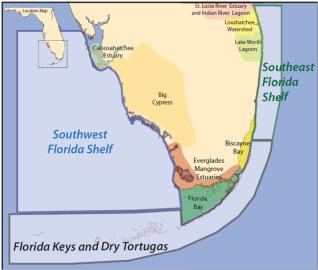The Marine and Estuarine Goal Setting for South Florida (MARES) Project, sponsored by NCCOS, increases awareness of and appreciation for the value of coastal marine ecosystems and their impacts upon human society. Over 50 MARES researchers (both natural and social scientists), managers, and stakeholders collaborated to understand and document cause and effect relationships along with the societal benefits of South Florida’s coastal marine environments. MARES facilitated a consensus on the most significant regulating processes and the key characteristics to be sustained in the coastal waters of three major areas (Florida Keys/Dry Tortugas, Southeast Florida Coast, and Southwest Florida Shelf).

The MARES team is publishing their findings in a special issue of the journal Ecological Indicators entitled ‘ Tools to support ecosystem based management of South Florida’s coastal resources.’ MARES products and tools help preserve important ecosystem services for a sustainable South Florida.
Traditionally, research and management of marine ecosystems has focused on the negative impacts humans have on the environment. MARES investigators realized that for citizens to embrace marine policy, citizens must understand not only the variety of pressures on the environment, but also the benefits they derive from it.
In order to create a consensus-based process for managing South Florida’s coastal marine environments, MARES includes human benefits in a systematic framework, enabling integrated ecosystem based management. This approach embodies NOAA’s effort to serve as the Nation’s environmental intelligence agency by providing information from science-based models to support the environmentally-sensitive decisions made daily by individuals, communities, and governments.
For more information, contact Kimberly.Puglise@noaa.gov.
